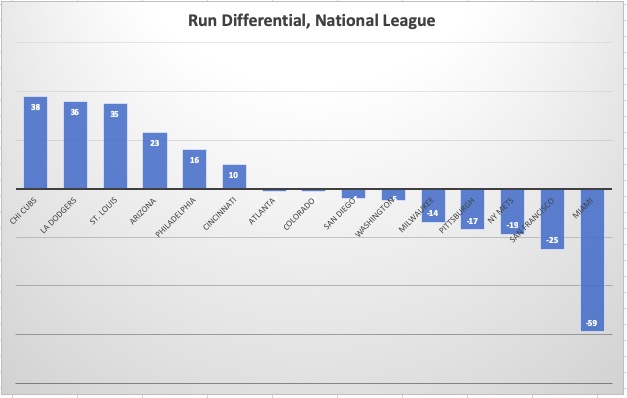Page 1 of 1
Division Opponents: Miami Marlins
Posted: Thu May 02, 2019 11:55 pm
by Edgy MD
Wow, that's what you call deviating form the mean:

Re: Division Opponents: Miami Marlins
Posted: Fri May 03, 2019 9:56 am
by MFS62
I'll resist the temptation to work something about deviant and Derek Jeter into one amazing insult* and just say, "couldn't happen to a nicer team".
Later
* = OK, so I couldn't resist.
Re: Division Opponents: Miami Marlins
Posted: Fri May 03, 2019 10:39 am
by Johnny Lunchbucket
I wouldn't have guessed the Mets differential was so bad though I know we got blown out a couple times
Re: Division Opponents: Miami Marlins
Posted: Fri May 03, 2019 10:41 am
by Centerfield
Didn't we see that run differential thing last year too? I mean for the Mets?
Re: Division Opponents: Miami Marlins
Posted: Fri May 03, 2019 10:52 am
by Edgy MD
I think run differential is getting harder to discern meaning from, as the difference between the effectiveness of front-end relievers and back-end relievers has never been so stark, and yet everybody carries eight.
It would be more meaningful if they weighted the runs for marginal value. If you lose 9-2 or 12-2, those last three runs don't mean that much — and you might have had your backup shortstop on the mound, but they count the same as the one run in last night's game.
But that Miami number just caught my eye. Baltimore's is even worse, but they at least have won a double-digit number of games.
Re: Division Opponents: Miami Marlins
Posted: Fri May 03, 2019 12:21 pm
by Centerfield
Yeah, I don't think it tells the whole story, but certainly that big difference can't be explained by throw away runs. That being said, it seems impossible that the Mets are 36 runs worse than the Phillies. That can't be right.
Re: Division Opponents: Miami Marlins
Posted: Fri May 03, 2019 2:01 pm
by batmagadanleadoff
The only criticism (or skepticism) I'd raise about the Mets dismal run differential is that it's still too early in the season to make much out of.
But the Pythagorean theorem is still a powerfully accurate tool, correlating strongly with a team's final W-L record. Throwaway runs allowed by the last relievers on the depth chart? They're not throwaway runs or meaningless runs because it's a telling sign just that a team reached a point in the game where it had to utilize those very back of the rotation mop up pitchers. So those tack on runs shouldn't be discounted. Besides, the formula's accuracy speaks for itself.
Re: Division Opponents: Miami Marlins
Posted: Fri May 03, 2019 2:15 pm
by Centerfield
That's a good point.
Re: Division Opponents: Miami Marlins
Posted: Fri May 03, 2019 4:56 pm
by batmagadanleadoff
Centerfield wrote: ↑Fri May 03, 2019 2:15 pm
That's a good point.
Thanks. Larger margins of victory are, really, the foundation of the Pythagorean theory -- the idea being that games that get out of hand and where the outcome is no longer in doubt are indicative of a team's strength. Good teams tend to win more games by larger margins whereas the closer the game, the more luck is involved and the less indicative of a team's ability. So to discount those "blowout" runs is, in a way, to undermine or even nullify the entire Pythagorean theory.
Re: Division Opponents: Miami Marlins
Posted: Fri May 03, 2019 6:14 pm
by Frayed Knot
The late-90s Yanquis run was marked by them consistently playing above their Pythag status with 1997 being the only exception [1996 thru 2001 = +4; -4; +6; +2; +2; +6]
And while none of the seasons were outrageously high so the whole thing could simply be written off to random variation, those teams often had a stark two-tiered bullpen system where the 3 or 4 best
and most highly paid relievers [usually Rivera, Stanton, Nelson, Mendoza] fronted a pen where the bottom half were minimum wage no-names hired so that George could demonstrate that he retained
some control over total team salary.
Torre, forced to use what he was given, was good at resting his top guys in games where the Yanx were trailing. If those scrubs pitched well in those games the offense often erased the deficit and he'd
go to the top guys to close it out. But when the scrubeenies would blow those deficits into routs the to guys would get the day off, resting up until they were actually needed, and the size of the loss was
written off as nothing more than one day of bad headlines in the midst of a dominant season.
Cause and Effect, or coincidence?
Impossible to prove one way or the other of course, but I remember thinking at the time that those teams seemed particularly susceptible to blowout losses out of proportion to their usual 100-win status.


